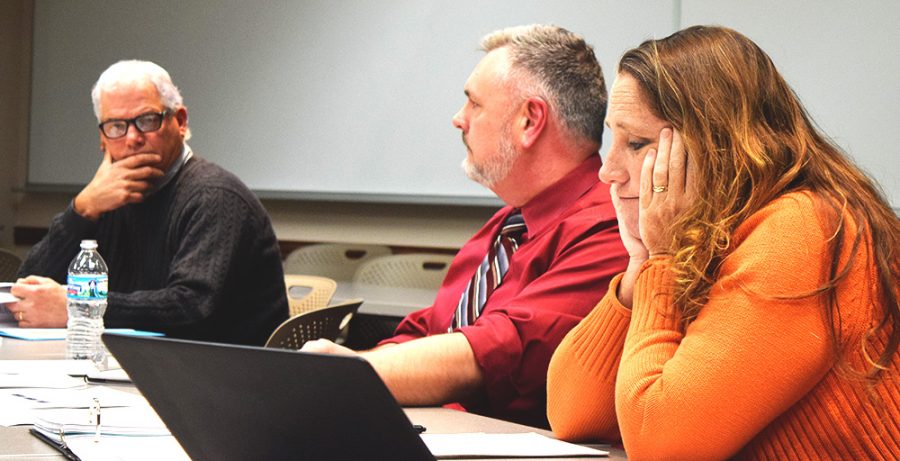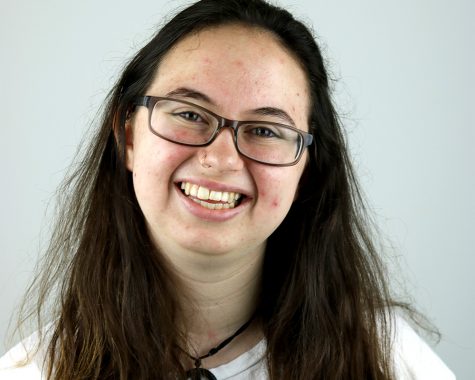Review committee takes a look at reorganizing colleges, four-day academic week
English Department Chair Dana Ringuette, Institutional Repository Librarian Todd Bruns, and Rebecca Throneburg, communication and disorders and sciences professor, listen to discussions about the potential schedule change. Bruns said he was interested in the potential four day week, with oppositions coming from Douglas Klarup, interim dean and professor of analytical chemistry.
October 29, 2017
Editor’s Note: The Review Committee for Workgroups no. 8 and 9’s proposals is looking at information based off last year’s vitalization project. Workgroup no. 8 from the vitalization project looked at creating programs that could increase Eastern’s enrollment and academic standings. Workgroup no. 9 looked at the efficiency of the university’s four academic colleges, schools and departments.
Reorganizing the colleges and changing to a four-day academic week were possibilities discussed at a meeting of the Review Committee for Workgroups no. 8 and 9’s proposals.
The reorganization of colleges struck a chord with committee members, while the possible schedule changes divided them.
Both proposals were discussed with reference to the committee’s three criteria: merits, priorities, and feasibility.
Reorganizing the colleges seemed to fill these criteria as a high priority and was seen as not only feasible, but necessary by the committee.
Currently, Eastern has four academic colleges, which Michael Dobbs, a management professor, said leads to inefficiency and the inability to change anything quickly.
“We haven’t been able to develop things, and we haven’t been very nimble,” Dobbs said. “We’ve got these big four ships going down the lane and if we need to make a change, it’s really, really difficult to know what to change and how to do it.”
Denise Smith, interim chair of the College of Business and Applied Sciences, said she agreed with Dobbs, especially coming from her college.
She said the combination of the School of Business with Applied Sciences causes a lot of confusion and extra work.
“It is very difficult to promote our identity as a School of Business when the title is College of Business and Applied Sciences, so there’s not any distinctiveness to that, but also from a management of resource and the management of programs, it’s challenging,” Smith said.
Dobbs said the bigger the colleges are, the harder it is for them to be transparent and to be held accountable for any wrongdoings.
“Right now, you’ve got a big college with 12 different departments. If you’re not doing so well, it’s kind of easier to hide,” Dobbs said. “If you got four departments, or six departments, in each college, that dean is going to be on you if you’re not doing good stuff.”
Although Workgroup no. 8 proposed only five colleges, some members, such as Dobbs, said they wanted to discuss increasing that number from five to eight to spread programs out more efficiently.
The new colleges would include departments that are similar to each other and would allow the deans to be more focused on their specific fields.
Workgroup no. 8 also mentioned an addition of a University College, which would house all undergraduate success programs, such as the Writing Center, in one building as opposed to all over campus. This University College would not house any major or minor programs.
Many members did not like the idea of proposing the creation of this college, but they did discuss the idea of grouping the similar programs under one roof to better help undergraduates navigate the campus and their future.
Another topic that was heavily discussed was Workgroup no. 9’s proposal to limit school weeks to four days, with Friday being an “EIU day,” or a day to hold meetings, which would reduce each semester by a total of two weeks.
The committee was divided on this topic, with some believing it could increase enrollment and others worried about how feasible this idea would be in reality.
Douglas Klarup, interim dean of the College of Sciences, said he was concerned about fitting labs into only four days.
Institutional Repository Librarian Todd Bruns said he was for this schedule change, saying the potential selling point of “always having a three day weekend” would be good for enrollment.
Student Body President Luke Young was concerned about students having only four required days on campus, saying it would hurt campus involvement.
“You’re talking about the experience, when you take Friday out of the equation you’re basically setting up that this university’s only really a place you want to be in four days out of the week, so it’s going to be even harder than it already is to get students involved with things,” he said.
Both discussions were tabled for the next meeting, as to give the members some time to discuss with fellow faculty and staff and to receive feedback on the two proposals, with the committee agreeing that moving forward with such big ideas would be impossible without consulting those who would be affected.
Future open meetings will be held at 3 p.m. in 2121 Lumpkin hall every Friday.
Brooke Schwartz can be reached at 581-2812 or bsschwartz@eiu.edu.



















![[Thumbnail Edition] Senior Foward Macy McGlone, getsw the ball and gets the point during the first half of the game aginst Western Illinois University,, Eastern Illinois University Lost to Western Illinois University Thursday March 6 20205, 78-75 EIU lost making it the end of their season](https://www.dailyeasternnews.com/wp-content/uploads/2025/03/WBB_OVC_03_O-1-e1743361637111-1200x614.jpg)

















































